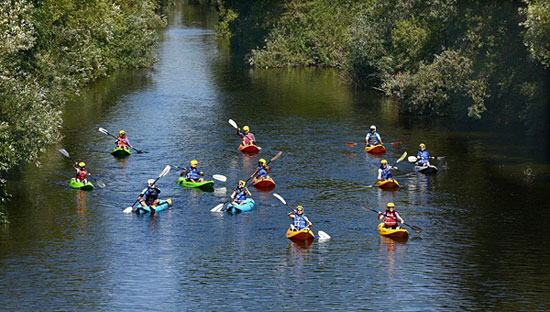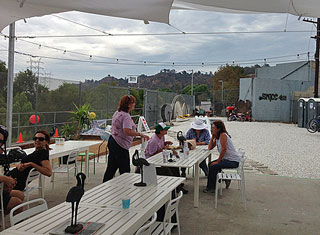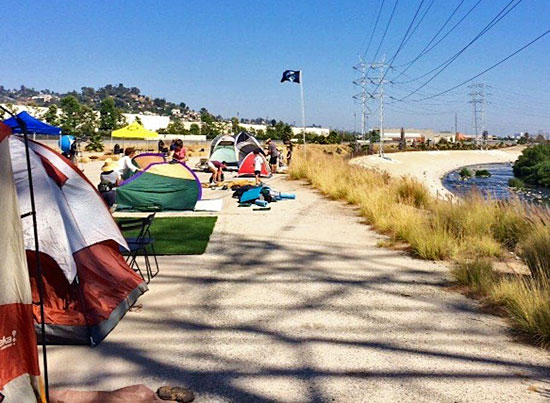
Once banned from most of the L.A. River, kayakers are now a regular summer sight. Photo/StreetsblogLA
Most Angelenos know that the Los Angeles River is making a comeback. Still, the hipsters hawking free breakfast on its banks were a surprise.
Waving their arms and proffering scrambled egg sandwiches and muffins they’d cooked on a camp stove, the group of about a dozen young people were on the bike path near Rattlesnake Park on Saturday morning, flagging down cyclists for no apparent reason beyond community building.
“They said they had done it before, and had just decided to do it again,” said one passing cyclist, a 24-year-old from Eagle Rock who’s been riding along the river near Griffith Park for years. “It seemed like they were just, like, ‘Let’s just get together and do something nice.’”
Gathering at the river to do something nice has become a trend this summer, as momentum has built around the restoration and revitalization of L.A.’s long-suffering namesake waterway.
With scores of projects already complete and a $1 billion Army Corps of Engineers plan expected to dramatically improve an 11-mile stretch between downtown and Griffith Park, a nascent but notable scene has taken hold along the once-maligned L.A. River, particularly where it has been spruced up with pocket parks, hiking trails and bikeways.
This summer, for instance, kayaking tours are being offered in public recreation areas in the Sepulveda Basin and in Elysian Valley; later this month, about 100 stand-up-paddlers and rowers will gather in the Glendale Narrows for a first-ever L.A. River Boat Race.
The Los Angeles River Corp. is offering outdoor bike-in movies along the riverbanks later this month and has its second annual Greenway 2020 10k race scheduled for early November. Meanwhile, the Elysian Valley Arts Collective will host its annual Frogtown Art Walk again next month by the river. Nearby, Elysian, an underground restaurant that materialized two years ago on the river near Atwater Village, will be up and running, legally and officially.

Along the L.A. River’s concrete banks, The Frog spot offers food, concerts and more. Photo/Franklin Avenue Blog
Elysian is also the home of Clockshop, a non-profit arts and cultural organization, and the site for more than a few weddings during the past year. And speaking of art, be on the lookout for the L.A. Mud People, a performance art group that frequents the river both as a medium and a backdrop.
“It’s really kind of miraculous,” marveled Lewis MacAdams, president of Friends of the L.A. River, which has itself drawn thousands of passersby over the past six weeks by staging free weekend concerts at The Frog Spot, an informal venue it set up this summer on Benedict Street along the Elysian Valley bike path.
“We’ve been surprised at how many people have showed up—probably 500 or so every Saturday and Sunday,” said MacAdams, adding that FOLAR will also be sponsoring a catch-and-release fishing event next month. “People are getting interested, and looking for community.”
MacAdams sees the interest as an outgrowth of the long political fight to restore the river, which was paved in the 1930s in an attempt to tame periodic but lethal floods. Nearly 4,000 people participated this year in FOLAR’s long-running annual river cleanup, he said—a record turnout—and each cleanup has helped spread the news of the river’s revitalization and potential.
So far, MacAdams said, most of the community activities have centered around FOLAR and the Elysian Valley arts community near Frogtown. “But a lot of it also is the bicycle population,” he said. “There are more bicyclists than we imagined, and they keep coming back.”
Julia Meltzer, executive director of Clockshop and the wife of David Thorne, who runs Elysian restaurant, agreed that the riverfront has become exponentially more active.
“There’s a lot more recreation and sporting,” she said, acknowledging that the various improvements, from friendlier landscaping to paved bikeways, have created occasional conflicts among walkers, cyclists, locals and other constituencies.
Nonetheless, a first-ever, free community campout along the river that Meltzer said she helped organize over Memorial Day weekend—along with California State Parks, the Mountains Recreation and Conservation Authority, the Natural History Museum and others—was fully booked within an hour of its announcement.
“I think it’s the big buzz, and the opportunity to come down to the river’s edge legally now,” said MRCA Chief Ranger Fernando Gomez, adding that some 200 campers showed up on Memorial Day and that hundreds more have shown up this summer for MRCA river programs, ranging from free community paddles to evening weenie roasts in Marsh Park.
“It used to be that people weren’t allowed in the river without a special use permit—it wasn’t meant for recreation,” Gomez said. “People would look at the river and think it was disgusting.
“But now, they can go down in, say, a kayak, and they see that the water is actually pretty clean, and there’s a heron right over there taking off with a fish in its mouth. They see that it’s not just all about concrete anymore,” Gomez said. “It’s a river—a real live river—now and people want to be part of it.”

A first-ever L.A. River campout over Memorial Day weekend was fully booked in an hour.
Posted 8/6/14






